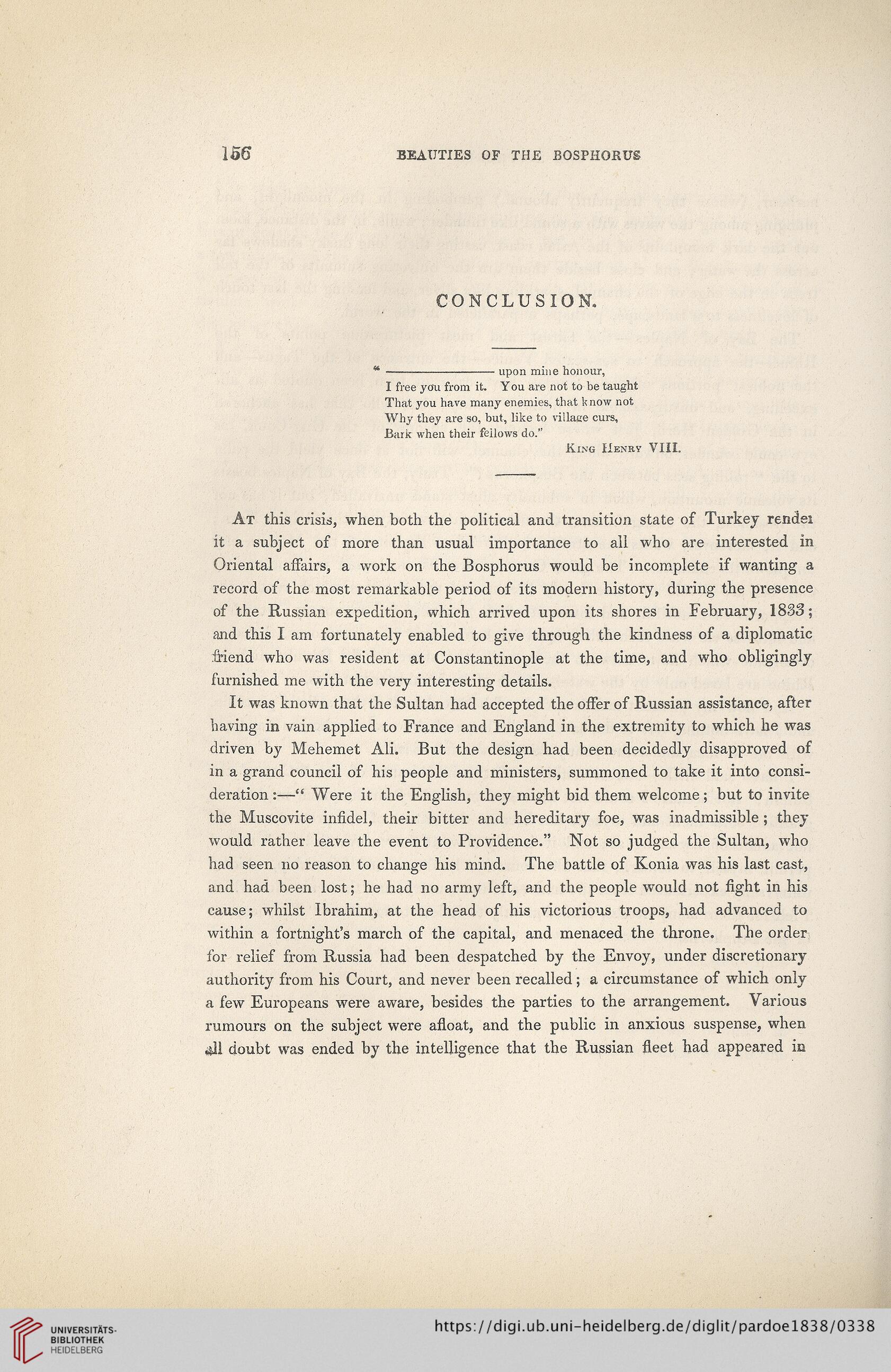156
BEAUTIES OF THE BOSPHORUS
CONCLUSION.
-upon mine honour,
I free you from it. You are not to be taught
That you have many enemies, that know not
Why they are so, but, like to village curs,
Bark when their fellows do."
King Henry VIII.
At this crisis, when both the political and transition state of Turkey render
it a subject of more than usual importance to all who are interested in
Oriental affairs, a work on the Bosphorus would be incomplete if wanting a
record of the most remarkable period of its modern history, during the presence
of the Russian expedition, which arrived upon its shores in February, 1833;
and this I am fortunately enabled to give through the kindness of a diplomatic
Fiend who was resident at Constantinople at the time, and who obligingly
furnished me with the very interesting details.
It was known that the Sultan had accepted the offer of Russian assistance, after
having in vain applied to France and England in the extremity to which he was
driven by Mehemet Ali. But the design had been decidedly disapproved of
in a grand council of his people and ministers, summoned to take it into consi-
deration :—" Were it the English, they might bid them welcome; but to invite
the Muscovite infidel, their bitter and hereditary foe, was inadmissible ; they
would rather leave the event to Providence." Not so judged the Sultan, who
had seen no reason to change his mind. The battle of Konia was his last cast,
and had been lost; he had no army left, and the people would not fight in his
cause; whilst Ibrahim, at the head of his victorious troops, had advanced to
within a fortnight's march of the capital, and menaced the throne. The order
for relief from Russia had been despatched by the Envoy, under discretionary
authority from his Court, and never been recalled; a circumstance of which only
a few Europeans were aware, besides the parties to the arrangement. Various
rumours on the subject were afloat, and the public in anxious suspense, when
all doubt was ended by the intelligence that the Russian fleet had appeared in
BEAUTIES OF THE BOSPHORUS
CONCLUSION.
-upon mine honour,
I free you from it. You are not to be taught
That you have many enemies, that know not
Why they are so, but, like to village curs,
Bark when their fellows do."
King Henry VIII.
At this crisis, when both the political and transition state of Turkey render
it a subject of more than usual importance to all who are interested in
Oriental affairs, a work on the Bosphorus would be incomplete if wanting a
record of the most remarkable period of its modern history, during the presence
of the Russian expedition, which arrived upon its shores in February, 1833;
and this I am fortunately enabled to give through the kindness of a diplomatic
Fiend who was resident at Constantinople at the time, and who obligingly
furnished me with the very interesting details.
It was known that the Sultan had accepted the offer of Russian assistance, after
having in vain applied to France and England in the extremity to which he was
driven by Mehemet Ali. But the design had been decidedly disapproved of
in a grand council of his people and ministers, summoned to take it into consi-
deration :—" Were it the English, they might bid them welcome; but to invite
the Muscovite infidel, their bitter and hereditary foe, was inadmissible ; they
would rather leave the event to Providence." Not so judged the Sultan, who
had seen no reason to change his mind. The battle of Konia was his last cast,
and had been lost; he had no army left, and the people would not fight in his
cause; whilst Ibrahim, at the head of his victorious troops, had advanced to
within a fortnight's march of the capital, and menaced the throne. The order
for relief from Russia had been despatched by the Envoy, under discretionary
authority from his Court, and never been recalled; a circumstance of which only
a few Europeans were aware, besides the parties to the arrangement. Various
rumours on the subject were afloat, and the public in anxious suspense, when
all doubt was ended by the intelligence that the Russian fleet had appeared in




